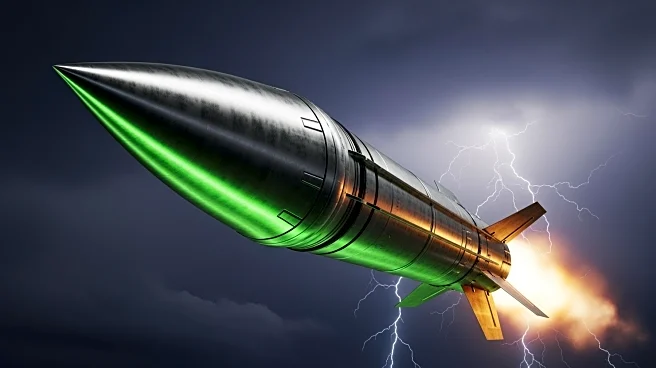What's Happening?
Russian President Vladimir Putin has announced the potential deployment of a new 'invincible' nuclear-powered cruise missile, drawing criticism and skepticism from international experts. The missile, known
as Burevestnik, is claimed by Moscow to be capable of bypassing all current and future missile defense systems. However, experts, including Jeffrey Lewis from Middlebury College, have raised concerns about the missile's safety, likening it to a 'tiny flying Chernobyl' due to its nuclear propulsion system. The missile's development has been marked by past failures, including a 2019 test explosion that resulted in fatalities and radiation spikes. President Trump has responded to Putin's announcement by emphasizing the U.S.'s own nuclear capabilities, including the presence of a nuclear submarine near Russia's coast.
Why It's Important?
The development and potential deployment of the Burevestnik missile highlight ongoing tensions between Russia and the United States, reminiscent of Cold War-era arms races. The missile's nuclear propulsion system poses significant environmental and safety risks, raising concerns about a new arms race that could destabilize global security. The U.S. response, emphasizing nuclear deterrence, underscores the delicate balance of power and the importance of maintaining strategic stability. The situation also reflects broader geopolitical dynamics, with Russia seeking to assert its military capabilities amid tensions over Ukraine and other regional conflicts.
What's Next?
The international community is likely to closely monitor Russia's missile developments and any further tests. Diplomatic efforts may intensify to address the potential risks associated with nuclear-powered weapons. The U.S. and its allies may consider strengthening missile defense systems and exploring diplomatic channels to mitigate the threat. Additionally, discussions on arms control and nonproliferation could gain renewed urgency as nations seek to prevent an escalation of nuclear tensions.
Beyond the Headlines
The Burevestnik missile's development raises ethical and environmental concerns, particularly regarding the potential for nuclear accidents and the long-term impact of radiation exposure. The situation also highlights the challenges of modern arms control, as technological advancements outpace existing treaties and agreements. The international community may need to revisit and update arms control frameworks to address emerging threats and ensure global security.









